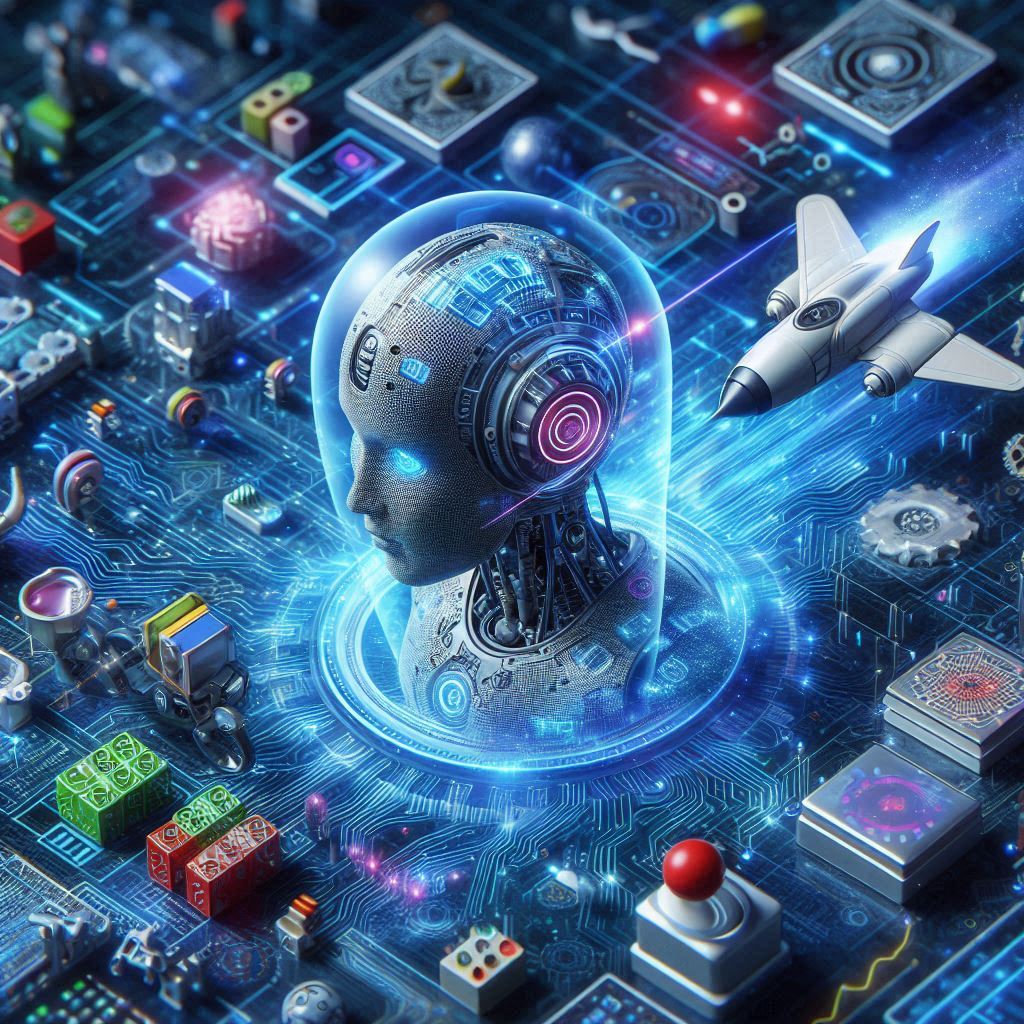
- November 26, 2024
- 5:23 am
AI and Machine Learning in Software Development: How They Are Changing the Game
Introduction
Artificial intelligence (AI) and machine learning (ML) are no longer just buzzwords—they are powerful technologies reshaping industries worldwide. In software development, AI and ML are rapidly transforming how applications are built, tested, deployed, and maintained. From accelerating coding processes to enhancing user experiences with personalized features, these technologies are empowering developers and helping companies deliver smarter, faster, and more resilient software. In this post, we’ll explore the integration of AI and ML into software development and how they’re revolutionizing the field.
1. Automating Code Generation and Optimization
AI-driven code generation tools are changing how developers approach coding, allowing them to work more efficiently and focus on high-value tasks. Here’s how AI is streamlining coding:
- Automated Code Completion and Suggestions: Tools like GitHub Copilot and IntelliCode use machine learning to offer intelligent code suggestions based on context, significantly reducing time spent on repetitive coding tasks.
- Bug Detection and Fix Suggestions: AI-powered tools can detect potential bugs and errors in real-time, often suggesting fixes. By identifying problems early, these tools reduce the likelihood of issues making it into production, improving overall software quality.
- Code Refactoring and Optimization: AI can identify opportunities to improve code structure, optimize performance, and remove redundancies. This automation speeds up the refactoring process and helps maintain clean, efficient codebases.
By automating repetitive tasks, AI enables developers to focus on complex, creative problem-solving, ultimately leading to faster and more reliable software development.
2. Enhancing Software Testing with AI and ML
Testing is one of the most critical phases of software development, and AI is making it faster, more thorough, and more reliable:
- Automated Test Case Generation: AI tools can automatically generate test cases by analyzing application code and user behaviors. This saves time and ensures that all potential user interactions are tested.
- Predictive Test Automation: AI-driven testing frameworks can analyze past testing patterns and predict which areas of the application are most likely to break. This allows teams to focus testing efforts on areas of higher risk, making the testing process more efficient.
- Visual Regression Testing: Machine learning models can detect changes in UI by comparing images of the application interface across builds. This automated visual testing ensures the UI remains consistent and user-friendly.
- Error Prediction and Fault Localization: AI tools can predict where errors are likely to occur in the code and locate bugs faster, minimizing time spent on debugging. By analyzing historical data, AI can learn from previous bugs and flag similar patterns in the current codebase.
AI-powered testing helps reduce human error, speeds up testing cycles, and improves test coverage, leading to a higher-quality product.
3. Improving Project Management and Resource Allocation
Project management in software development can be complex, especially with large teams and multiple deadlines. AI is streamlining project management tasks, from resource allocation to time tracking:
- Predictive Analytics for Project Timelines: By analyzing past projects, AI can estimate completion times and resource needs for new tasks, enabling teams to set realistic timelines and avoid project delays.
- Smart Resource Allocation: AI-driven tools can help project managers assign resources based on skill levels, workload, and availability. This helps balance workloads, avoid bottlenecks, and ensure optimal team performance.
- Real-Time Progress Monitoring: AI tools monitor development progress in real time, identifying any deviations from project timelines and offering suggestions to bring the project back on track. This proactive approach minimizes risks and keeps projects running smoothly.
Using AI for project management optimizes resources, improves planning, and helps meet project deadlines with fewer hurdles.
4. Delivering Personalized User Experiences with AI-Driven Features
AI and ML have opened up possibilities for creating more dynamic, user-centered applications by personalizing features and content:
- Recommendation Engines: AI-based recommendation systems, like those used in streaming and e-commerce platforms, analyze user behavior and preferences to offer personalized content suggestions. This improves user engagement and satisfaction.
- Chatbots and Virtual Assistants: AI-driven chatbots can offer real-time customer support, answering common questions, and providing troubleshooting help. They improve the user experience by providing fast, accessible support and freeing up human resources for complex issues.
- Dynamic Content Personalization: AI models can tailor app interfaces, notifications, and even in-app features based on individual user behaviors. By creating personalized experiences, applications become more engaging and relevant for users.
Personalized features not only improve user satisfaction but also drive higher engagement, helping companies meet their business goals.
5. Enabling Predictive Maintenance and Monitoring
AI can help maintain software reliability by predicting potential failures and ensuring uptime:
- Predictive Maintenance: Machine learning models analyze historical data from software systems to identify patterns that could indicate future failures. This proactive approach allows developers to address issues before they affect users.
- Anomaly Detection: AI-driven monitoring systems can detect unusual patterns or anomalies in system performance, alerting developers to potential issues. This enables rapid response to unexpected problems and minimizes downtime.
- Performance Optimization: AI tools can continuously monitor application performance, identifying areas for improvement in real-time. This helps maintain optimal performance and scalability as user demands fluctuate.
Predictive maintenance and AI-driven monitoring reduce system downtime, ensuring a smoother user experience and more reliable application performance.
6. Data-Driven Decision Making
AI and ML make it easier to gather and analyze data throughout the development process, allowing developers to make informed, data-driven decisions:
- User Behavior Analytics: AI analyzes user data to reveal trends, feature usage, and potential improvements. This helps prioritize new features and guide product evolution.
- Performance and Usage Insights: AI tools can provide insights into application performance and scalability, highlighting areas that may require additional resources as the user base grows.
- Product Roadmap Optimization: By analyzing historical usage and performance data, AI can help teams make data-driven decisions about which features to develop or improve next, ensuring the product roadmap aligns with user needs and business goals.
Data-driven insights lead to smarter decisions and a more responsive development process, enabling teams to deliver applications that better meet user expectations.
7. Ethical AI and Responsible Development
As AI becomes more prevalent, it’s crucial to address ethical considerations in its integration:
- Data Privacy: AI relies on data, but developers must handle this data responsibly. Implementing strong data privacy policies and anonymizing user data are essential to maintain user trust.
- Bias Mitigation: AI models can inadvertently introduce biases if not carefully managed. Developers must actively work to recognize and mitigate biases to ensure fair and inclusive applications.
- Transparency and Accountability: Be transparent with users about how AI is used in the application. Providing information on how AI-driven decisions are made can help build trust and accountability.
By developing AI with ethical guidelines in mind, software teams can deliver more reliable and inclusive products that respect user rights and maintain public trust.
Conclusion
The integration of AI and machine learning into software development is transforming the field, enabling developers to create smarter, faster, and more responsive applications. From automating coding and testing processes to delivering personalized user experiences, AI empowers development teams to work more efficiently and innovate at an accelerated pace.
However, implementing AI in software development also requires a commitment to ethical practices, transparency, and data privacy. By adopting AI responsibly and strategically, development teams can build software that not only meets business goals but also improves the user experience and builds trust.
As AI and ML technologies continue to evolve, their role in software development will only grow. By staying informed and adaptable, development teams can leverage the full potential of AI to drive innovation and maintain a competitive edge.
Call to Action
Ready to transform your development process with AI? Explore AI-driven tools for coding, testing, and project management, and see how they can help you create smarter, more efficient applications. Embrace the future of software development—start integrating AI today!
Hey
I'm Emma!

Lorem ipsum dolor sit amet, consectetur adipiscing elit. Ut elit tellus, luctus nec ullamcorper mattis, pulvinar dapibus leo.
